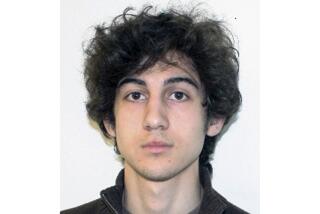Boston, bombs and Miranda
Dzhokhar Tsarnaev, the 19-year-old naturalized U.S. citizen suspected of planting bombs at the Boston Marathon, was charged Monday with using a “weapon of mass destruction” against people and property, and he faces an aggressive prosecution and the possibility of the death penalty.
But that’s not good enough for Sens. Lindsey Graham (R-S.C.) and John McCain (R-Ariz.). Because Tsarnaev and his brother, Tamerlan, “were not common criminals … but terrorists trying to injure, maim and kill innocent Americans,” the two senators would rather see Tsarnaev plucked from the judicial system, classified as an enemy combatant, deprived of a lawyer and placed in military detention.
To its credit, the Obama administration rejected the senators’ counsel. That position is consistent with the president’s long-standing promise not to authorize the indefinite military detention without trial of American citizens. Yet in one sense the administration is splitting the difference between its approach and that of its critics.
FULL COVERAGE: Boston Marathon attack
On Friday, the U.S. attorney in Boston said the Justice Department was invoking a “public safety exception” to the Miranda rule that in most cases requires police to advise suspects in custody of their right to remain silent and their right to an attorney. Under the exception, announced in a 1984 Supreme Court decision, police may forgo reading a suspect his rights in the interests of public safety — and if the suspect then makes an incriminating statement, it can be used at trial.
In that case, police asked a suspected rapist who had entered a supermarket where his gun was, and the suspect said it was “over there.” The court allowed the use of that statement even though the suspect hadn’t been advised of his rights because police were motivated by a desire to protect shoppers and employees from being harmed by the weapon.
It would have been a legitimate use of the public safety exception in the Boston case if law enforcement officials had refrained from reading Tsarnaev his rights only for as long as it took to establish whether other bombs had been planted. The problem is that the administration is on record as taking a much broader view of the exception. In 2010, the Justice Department issued a memo that stretched the public safety exception to cover “exceptional cases in which, although all relevant public safety questions have been asked, agents nonetheless conclude that continued unwarned interrogation is necessary to collect valuable and timely intelligence not related to any immediate threat.”
On Monday, a federal magistrate finally informed Tsarnaev of his rights. We hope that, in the days and hours before that intervention, his interrogators didn’t exploit his ignorance to build their case. A public safety exception so broad that it swallows the Miranda rule would be bad for the constitutional rights of all Americans.
More to Read
A cure for the common opinion
Get thought-provoking perspectives with our weekly newsletter.
You may occasionally receive promotional content from the Los Angeles Times.






